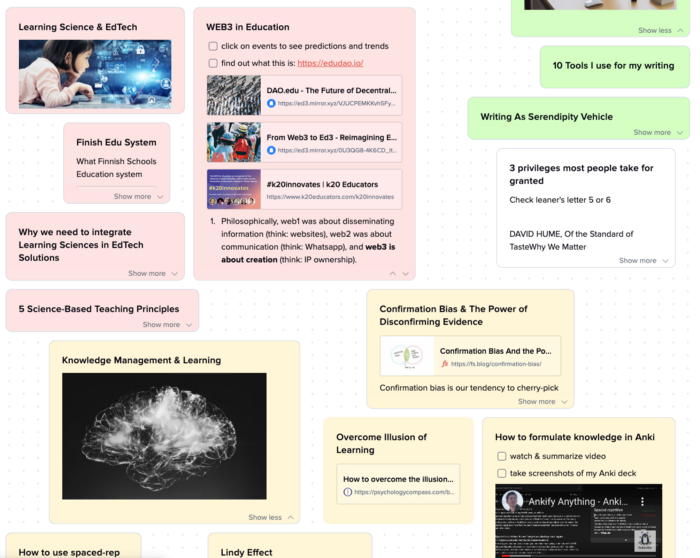A straightforward approach to ideation so you never start with a blank page.

Every great article starts with an idea. But while ideas are your entry ticket to writing, they can also be a barrier.
Lucky people feel overwhelmed by their abundance of ideas. Others find themselves uninspired, staring at the blank screen.
I was among the latter.
When I started writing online I was sure I’d soon run out of ideas. I feared I’d quickly use up the good ones. I felt uncreative and as if I had not much worth sharing.
It took me months to understand how wrong I was.
Creativity is practice. With the right process in place, you’ll never have to run out of ideas.
The following three-step process is my writing fuel. It has helped me publish more than 300 articles, and reach over two million readers. This structure can help you never again struggle with ideas.
1) What goes in will come out
Most writing consists of living your life and consuming content. Only some part of the process is actually sitting down, writing, and editing your work.
And most importantly, the former determines the latter. How you live your life informs your writing.
Most people mindlessly consume content. They scroll through the jungle of ever-growing content. Occasionally they’ll stumble upon interesting ideas, but mostly they consume trash.
On the internet, consuming trash content is the default option. Unless you work against it, you’ll find yourself in the doom of social media and daily news cycles.
A couple of years ago, I spent two hours a day scrolling through Facebook, reading through newspapers, or listening to news podcasts. It wasn’t until a smart friend told me to replace news consumption with reading books, that things changed.
Digging deeper than the often superficial social media posts will increase your understanding of the world. And it will also help you become a better writer.
By avoiding mediocre content and consuming the greatest inspirational resources, you’ll find yourself writing better articles. Because what goes in will come out.
How to apply this:
Which content are you regularly consuming that’s not adding value to your life? Replace it with better stuff.
Go beyond the content everyone else is reading. There are Goodreads, Gatesnotes, and so many other best-selling lists that suggest what you should be reading. Most of these lists contain books from authors with the best marketing strategy or the broadest social media reach.
If you look at human history, the chances are small that the greatest books were created in the past decade. The fundamental human problems seem to be the same in all ages: Justice, love, virtue, stability, and change itself.
Search, for example, through the appendix of Mortimer J. Adler’s classic How to Read a book. Alternatively, ask the smartest and most inspiring people you know which type of newsletters, books, or online articles they read and listen to.
I asked my students at the Writing Online Accelerator to add their most-inspiring resources to an inspiration board. (Click here to get the full board free).

2) How to program your mind to come up with ideas
There’s a crucial thing to keep in mind when it comes to ideas: Don’t scare them away.
Be gentle on how you treat your ideas and monitor your thoughts.
If you label your ideas as ‘bad’ without noting them down, you hinder your ideation process. You don’t give your mind the safe space for the ‘good’ ideas to arise.
There’s no such thing as a ‘bad idea’. Here’s how to transform your thinking.
My idea is worthless =► Every idea is valuable.
Don’t judge your ideas while writing them down. Ideas are like raw diamonds, and you don’t know how they’ll turn out until you’ve written the article.
This has been written before. =► This has not been done by me.
Yes, your idea exists in some form on the internet. Unless you’re doing ground-breaking scientific research, many people have written about your idea. But don’t let that hold you back. You’re the best at living your life. You can add your unique perspective to the conversation.
I don’t have enough ideas. =► I have plenty of ideas.
In the beginning, you won’t have an abundance of ideas. But if you let yourself be inspired and treat your ideas well, they’ll arise. The more you create, the more creative you become. The best ideas and connections will arise once you flow into the writing process.
How to apply this:
Say yes to any idea that strikes your mind. Stop worrying whether other people have written about a topic.
You’ve not written about it yet, and that’s the only thing that matters. Don’t be scared to write about the same idea twice or thrice.
You’ll become more specific every time you write about it. Lastly, trust the process. You’ll have more ideas with every article you write.
“Most things have been done, but they have not yet been done by you.”
— Elizabeth Gilbert
3) Have one tool to capture your ideas
Once you’re aware of the ideation process, it’s time to capture and store your ideas.
There’s an insane amount of tools you can choose from. At the beginning of my journey, I used Trello. Then I switched to Notion and I experimented with an excel sheet. For a while, I settled for Milanote. Milanote was visually appealing to me, I could use it via my phone as well, and it is searchable.
In April 2022 I discovered xTiles. The platform combines all features I was looking for. It’s a mixture of note-taking and a whiteboard — as if Milanote and Notion had a baby.

How to apply this:
Experiment, and choose a tool that feels good to you, and where you really going to capture all the ideas. It can be a google sheet, a journal, xTiles, Notion, or any other tool you like.
When choosing your tool, think about: Do you know how to use it? Do you like how it looks and feels? Will you use it every day?”
When you write down your ideas you communicate to your brain that it’s worthy to generate more ideas. If you have ideas and don’t follow them, you teach your brain you’re not doing anything with them. You’ll doubt your ideas more and more. So say yes to all ideas that come to my mind and capture them in a single place
Remember the essence
To never run out of ideas, you’ll need to:
- Consume inspirational content
- Treat your ideas well: there aren’t any bad ideas
- Capture your thoughts: every time an idea comes to your mind, save it on your idea board
Ideas are the magical place where your writing starts. Steal my three-step process to always start in idea abundance.
Ready to accelerate your writing journey and build an online audience?
Subscribe for a free 5-day course on how you can set up the single most important thing writers usually forget to attract a large audience online. With a total time investment of only 20 minutes.